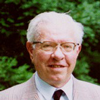
Biografia estratta da http://www.phys-astro.sonoma.edu
(1915-2001) Fred Hoyle was born in Yorkshire in northern England on 24 June 1915 and educated in mathematics and theoretical physics at the University of Cambridge. After wartime work on the development of radar he returned to Cambridge, where he remained from 1945 to 1973, with many long-term visits to the California Institute of Technology and the Mt. Wilson and Palomar Observatories. He founded Cambridge’s Institute of Theoretical Astronomy and served as its first director. His early work on stellar evolution led to his famous collaboration with Margaret Burbidge, Geoffrey Burbidge and William Fowler on the synthesis of the elements beyond helium in stars. Hoyle successfully predicted the existence of a resonance in carbon-12 that was essential to helium-burning in stars. In 1948 Hoyle, Hermann Bondi, and Thomas Gold developed the steady state cosmological model. Hoyle provided a mathematical theory of the model consistent with the general theory of relativity.
The leading spokesman for the new theory, he coined the term “big bang” for the competing model during a radio lecture. He also worked on numerous other problems in theoretical astrophysics and cosmology. He, Geoffrey Burbidge, and N.V. Narlikar supported a (quasi) steady state universe in a 2000 book. He was also the proponent of the equally unpopular idea that life came to earth from elsewhere. This theory resulted from his extensive collaboration with Chandra Wickramasinghe on the infrared spectra of interstellar grains. The author or coauthor of much science fiction, a play, and more than twenty nonfiction books, Hoyle was a leading popularizer of science. He died on 20 August 2001.